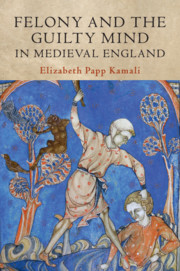Book contents
- Felony and the Guilty Mind in Medieval England
- Studies in Legal History
- Felony and the Guilty Mind in Medieval England
- Copyright page
- Dedication
- Contents
- Figures
- Acknowledgments
- A Note on the Text
- Abbreviations
- Introduction
- Part I Felonia Felonice Facta: Felony and Intentionality
- Part II Þe Deuylys Doghtyr of Hellë Fyre: Felony and Emotion
- Part III Handlyng Synne: Guilt and Innocence
- Part IV Dies Iræ: Judge and Jury
- Conclusion
- Bibliography
- Index
Introduction
Published online by Cambridge University Press: 18 July 2019
- Felony and the Guilty Mind in Medieval England
- Studies in Legal History
- Felony and the Guilty Mind in Medieval England
- Copyright page
- Dedication
- Contents
- Figures
- Acknowledgments
- A Note on the Text
- Abbreviations
- Introduction
- Part I Felonia Felonice Facta: Felony and Intentionality
- Part II Þe Deuylys Doghtyr of Hellë Fyre: Felony and Emotion
- Part III Handlyng Synne: Guilt and Innocence
- Part IV Dies Iræ: Judge and Jury
- Conclusion
- Bibliography
- Index
Summary
The introduction opens with the plaintive cry of a medieval English outlaw bemoaning the uncertainty of the common law. It then situates the book within the broader history of the concept of mens rea and describes the methodology to follow, with a particular emphasis on the juxtaposition of legal and literary texts. A summary of sources is followed by a brief introduction to the Anglo-Saxon and Angevin antecedents to jury trial for felony and a description of the shift from ordeal to jury trial. After a brief chapter summary, the introduction provides a primer in medieval English felony procedure geared toward readers not already familiar with medieval English criminal law. Using an invented homicide narrative, the introduction outlines the various paths a person accused of felony might choose in the aftermath of an alleged crime, as well as the different avenues open to those inclined to prosecute. While some of this introductory material will be too rudimentary for experienced historians of the common law, this basic foundation makes the book accessible to a broader audience.
- Type
- Chapter
- Information
- Felony and the Guilty Mind in Medieval England , pp. 1 - 30Publisher: Cambridge University PressPrint publication year: 2019

